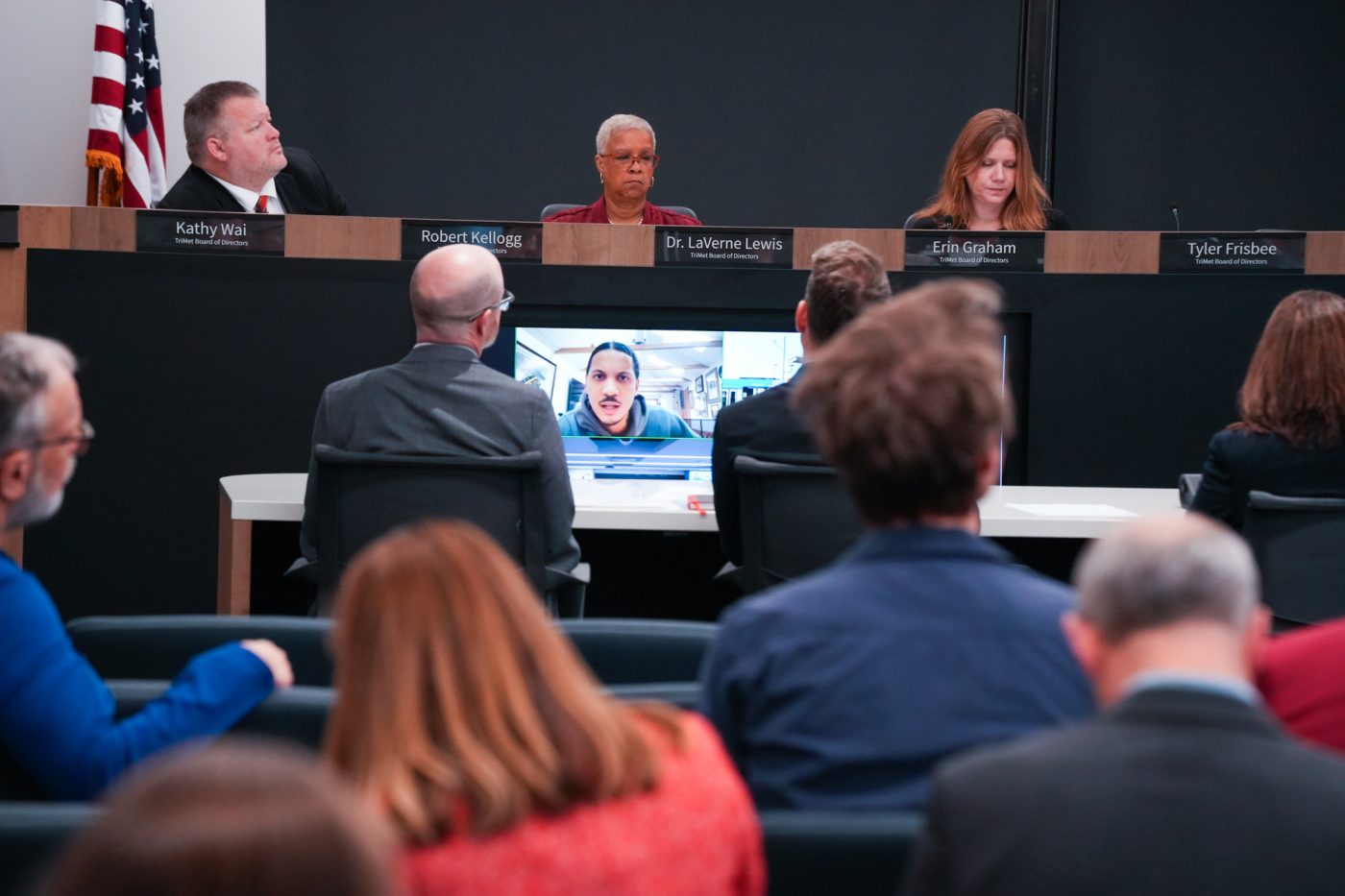
TriMet staff and their general manager, Sam Desue, attempted to walk back a recommendation released last week to build just three miles of semi-dedicated bus lanes as part of their 82nd Avenue Transit Project. The controversial staff recommendation, first reported by BikePortland, opted for three miles of business access and transit (BAT) lanes, instead of the seven miles many transit riders and advocates were hoping for.
At a TriMet Board Meeting this morning in downtown Portland, GM Desue and TriMet’s Interim Director of Major Projects Michael Kiser, both attempted to pin blame for the massive public outcry around the decision on BikePortland.
“I do think there was a recent blog post that may have misled readers about our stance with regard to BAT lanes and where we are with the project,” Desue said at the outset of the discussion (which was rushed onto the agenda due to public pressure around the topic). “So I asked staff to give an update and help clear the air.”
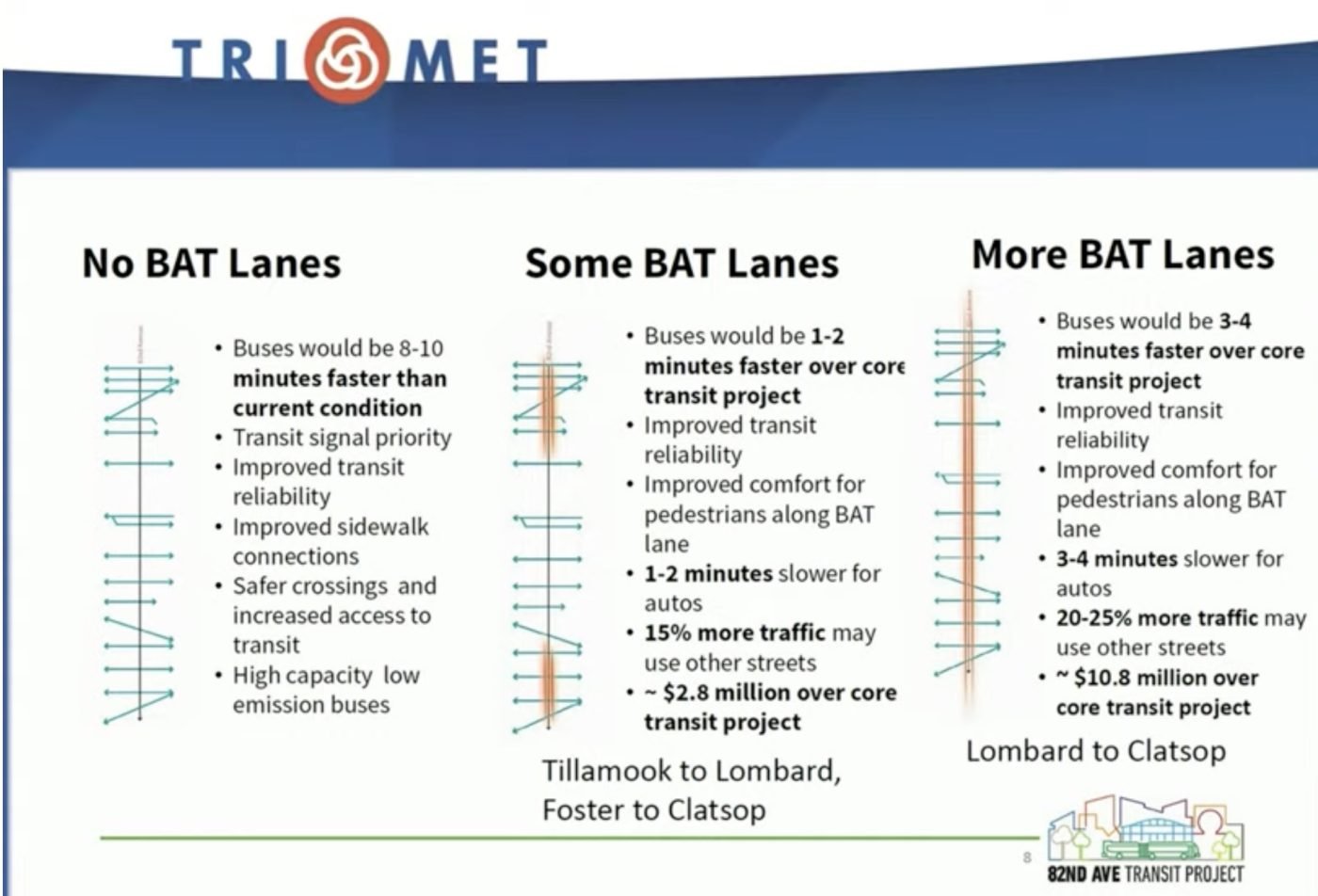
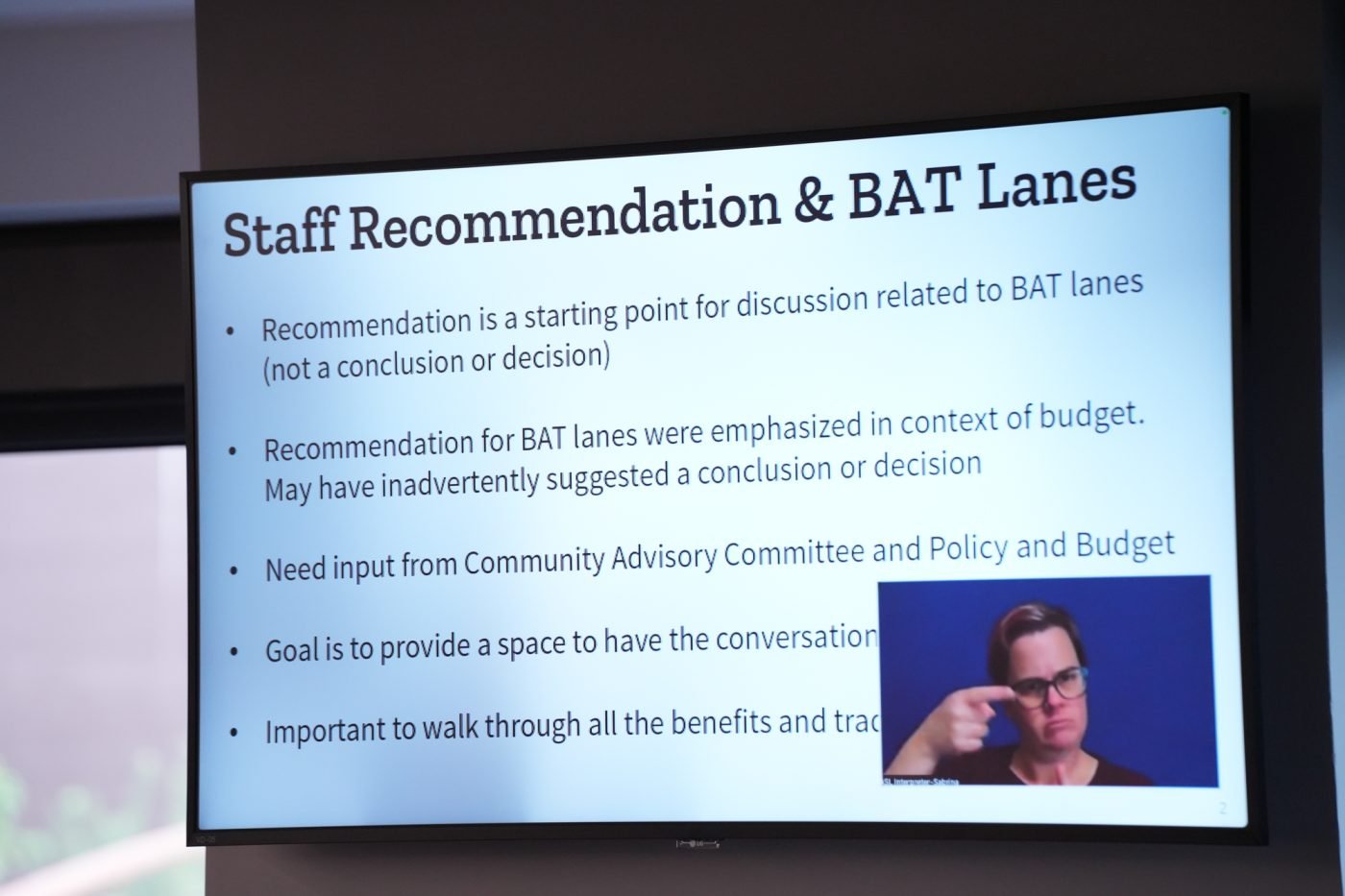
After a staff presentation about the project, Kiser — along with 82nd Ave Transit Project Manager Jesse Stemmler and Interim Executive Director of Engineering and Construction Jamie Snook — received a bit of a scolding from board members. The board members wanted answers after having been inundated by emails about the project since my story was published on Friday.
Board Member Erin Graham spoke first. “I’m curious how the process is being communicated with the public,” she asked. “We put the recommendation online and that generated significant response that’s being sent to the board, so I don’t know that the process was very clear or transparent to people.”
“I know this is a little bit blunt, and I’m not looking to assign blame,” said Board Member Robert Kellogg. “But when 50 emails show up in my inbox Monday morning, I know something has happened that caught the public by surprise. So, without assigning blame, what happened?”
“We were also caught by surprised,” Kiser replied. “Some of this was spurred by an article on BikePortland. I think because all the information wasn’t out there, it created confusion and immediately people went into action thinking this decision had been made because project team had put out a recommendation. And that simply wasn’t true.”
To be clear, my reporting was accurate and fair. It was based on good sources and done with an understanding of more context around the project than just the staff memo. In the opening line of my story I wrote, “In a move that has stunned transit advocates, TriMet 82nd Avenue Transit Project staff have recommended…”. It’s a fact that TriMet staff made a decision to recommend three miles of BAT lanes.
Kiser went on to say he and other staff have had to respond to the “fallout” of public reaction to the news since Friday and that he hopes a project Community Advisory Committee meeting tonight (6:00 pm at Portland Community College Southeast Campus will “set things back on track.”
But Board President Dr. LaVerne Lewis wasn’t done. “Today you said you are at 30% design, but your memo says clearly 60%, and I think that’s part of being clear to the community and being very transparent.”
“Well, we finished 30%. We’re in this in-between point between 30% and 60%. So the recommendation was really focused on outlining a potential option as a starting point for what we bring into the 60% [design phase],” Kiser replied.
“But [the memo] doesn’t say that,” Dr. Lewis interjected.
She went on to share that she has received “over 50 letters” of concern about the BAT lane staff recommendation and that she stayed up until nearly midnight answering them all. “That, for me, was not a sign that there was communication, clearly, of the process.”
Board Member JT Flowers was next to speak. He urged TriMet and his fellow board members to be stronger advocates for transit.
“I think we get ourselves into trouble when we try to be something that we’re not,” Flowers said. “We are a transit agency at our core. Our core function is to advance the cause of public transit and make sure that people have safe, reliable and accessible ways to get to and from anywhere they care to get to and from. With an understanding of that core function comes, I think, a necessary understanding of the types of positions that we need to be more comfortable asserting on issues like this.”
Flowers went on to say the vast majority of people in his district have clearly said they want 82nd Avenue to be a “neighborhood corridor.” “This project is core to that. These BAT lanes are core to that,” he added.
“Let’s play to win, rather than playing not to lose. And I think playing the win here means going for a full BAT scenario, rather than in the reduced scenario that was proposed in that memo.”
– JT Flowers, TriMet board member
Then Flowers added: “As an agency, I’d like to see us get more comfortable standing in that, rather than constantly trying to equivocate and balance things out.” Later in the meeting, Flowers continued in this vein when he said TriMet and their board “very frequently miss opportunities to show up and lock arm-in-arm” with the region’s hundreds of thousands of transit riders and transit advocates. “This feels like such a no-brainer from the perspective of a transit authority.”
“Let’s play to win, rather than playing not to lose,” he said. “And I think playing the win here means going for a full BAT scenario, rather than in the reduced scenario that was proposed in that memo.”
Like I shared more about in a story on Monday, another point where TriMet has lacked clarity in this process is who will make the ultimate decision about the BAT lanes on 82nd. Even Flowers was in the dark about that question. He asked staff to explain exactly where that decision would come from.
Both Kiser and GM Desue responded to the question by clarifying that the decision will ultimately be made by the project’s Policy and Budget Committee — a committee made up of seven people (GM Desue (Chair), Clackamas County Commissioner Diana Helm, Metro Councilors Duncan Hwang and Christine Lewis, ODOT Policy & Development Manager Chris Ford, PBOT Director Millicent Williams and Community Advisory Committee (CAC) Representative Franklin Ouchida) which for some reason still does not have a page on the project website. (The only way I know who is on the committee is because I asked TriMet.)
From what I heard today, it seems unlikely that TriMet will ultimately settle on the “Some BAT” — or three miles of enhanced bus lanes — option. While some business owners are vehemently opposed to the bus lanes (the owner of Washman Car Wash testified against them at the board meeting, saying they’d create, “serious impediments to the vehicles trying to get to 82nd Avenue businesses”), they are broadly supported by policymakers, elected officials, and bus riders.
“We are switching paths,” Kiser assured board members during his remarks today. “We put out a recommendation… but clearly it’s more valuable to have a bigger conversation where the Policy and Budget Committee can weigh in an maybe even be the decision maker on the extent of the balance that we choose to move forward.” Then he offered a note of warning. “And that will likely require support outside of the project [meaning beyond the staff level] financially, in terms of policy, politics, etc…”
“I think it’s going to be a great conversation where we all need to lean in to say, ‘What do we want and how are we going to get there together?'”
That conversation starts up again tonight at 6:00 pm at the CAC meeting. See the committee website for details.




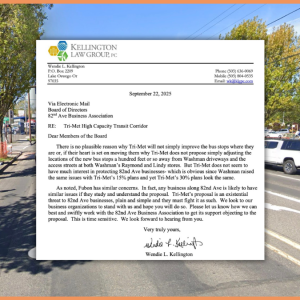

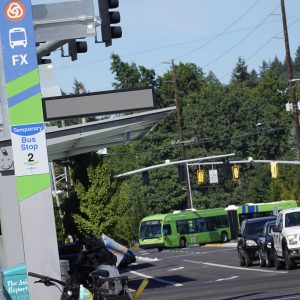
Thanks for reading.
BikePortland has served this community with independent community journalism since 2005. We rely on subscriptions from readers like you to survive. Your financial support is vital in keeping this valuable resource alive and well.
Please subscribe today to strengthen and expand our work.
Thank you for your reporting on this. I’ll be at the CAC tonight to represent the “More BAT” option once again. It’s so great to hear Trimet pivot toward pushing hard for transit, as they should. JT Flowers sounds like a great advocate.
Nice work Jonathan!
Once again, fantastic work, Jonathan! Your persistence to cover these issues is greatly appreciated. This whole situation feels very similar to the Broadway fiasco where a government agency tries to quietly move a very unpopular plan forward hoping nobody will notice.
What a mess. If the recommendation is so unimportant why make it? They’re talking like writing up a report saying “I think we should do this and so in our next steps this is what we’ll work on” is something they do randomly in any given direction all the time, and no one should be holding them responsible for their words. Michael Kiser was paid $190k last year when he was just the “manager of small starts projects.” Maybe we should give that money to someone who thinks this stuff is important?
This is disingenuous hedging from Trimet leadership. The staff recommendation is extremely important and represents the most likely outcome on the direction of a project. The decision-making committee certainly has the theoretical power to take a different approach or send the staff back to work on it some more, but practically speaking these types of recommendations usually get a quick rubber stamp.
Not sure why they would bring forward such a recommendation. Typically people don’t spend weeks of work for an option like that unless some higher up asks for it.
Awesome reporting as always Johnathan. Thank you for helping the public stay informed on these important issues!
Good quotes from board member JT Flowers. I wonder if the other board members see their roles this way?
Sorry, but this is stupid and patronizing, and the PM who said this should be deeply embarrassed. Surely it’s reasonable to expect the result of the project team recommendation to be what gets implemented. That’s why people are concerned – because TriMet staff are (seemingly) unwilling to implement the option that the public told them they wanted.
The memo lists “project budget considerations” as a factor. I’d kindly ask TriMet to not ask the public if they want an option that can’t be done for budget reasons.
It also lists technical analysis. Again, if a part of a project isn’t technically feasible, we shouldn’t be asking if the public if they want it (also, just have to laugh at the idea that it’s not technically feasible to repaint parts of 82nd).
That sort of just leaves us to analyze the relative role of business feedback and community feedback. I can’t help but feel that this is a clear example of business feedback being taken at face value, while the community has to fight and fight to get a crumb of anything. BAT lanes are already less than this corridor deserves, and its embarrassing that TriMet staff are doing even a BRT-light project that BAT lanes on 30% of the corridor as the only amount of dedicated right of way.
Mam, I do deliveries and I promise you aint no way Im going near 82nd ave if its a single lane road. Go to any other city and they have 3 or 4 lane arterials for a density of this size(Phoenix, Tucson, Lake Havasu, Salt Lake, Sacramento, San Diego, Missoula, Boise etc… anyone even entertaining this idea is totally insane. Thats where the backlash is coming from, didabling a desperately needed lane so its dedicated to less than 1% of vehicle flow. You people are tooooooooooo muuuuuch! Its got to be the vaccines because this issue is as black and white as I HAVE EVER SEEN IN TRANSPORTATION.
Yes, it’s the vaccines. BikePortland members have received MMR, polio, tetanus, and other vaccines that deeply inform our stances on transportation issues.
You’ve already made a choice without seeing any effect. That’s unwise. Yet here you are claiming vaccines make people “too much”. Okay…
Listing Lake Havasu is objectively funny, so I can only assume this is thinly veiled satire.
And those 1% of vehicles carry something like 25% of person-level traffic. I think prioritizing a more space efficient vehicles makes perfect sense on a busy corridor.
GM Desue: “why are people getting so upset, a decision hasn’t been made to do a bad compromise, we just recommended that we do a bad compromise. Total misunderstanding.”
What disingenuous backpedaling. People are mad because you *recommended* we don’t do the full BAT option. We’re not idiots, we realize a final decision hasn’t been made or we wouldn’t have been complaining to you.
Why would you think disabling the most needed traffic lane in all of portland so that less yhan 1% of vehicle flow can use it? Do you know you wont be able to freely maken lefts anywhere and you can cross the street without going up and back 6 lights. The street is already broken, this will depopulate the businesses in the area its incredibly obvious stop acting like this is even debatable!
If the businesses are really so important, people will patronize them regardless of the street layout. As roads have been for decades, people have already gone many places despite the inconvenience and stress of getting there.
1: I don’t know if it’s the most needed, that sounds subjective. It’s a redundant lane on a redundant urban highway.
2: I don’t care one but about vehicle flow, that’s not a goal for anyone. I care about people flow, and it’s a lot more than 1% if that. And the cars still have that other lane.
3: this screeching about how hard it is to turn left is utterly ridiculous. You are in the single most coddled and easy form of transportation. It isn’t HARD to drive 2 blocks and make a U turn. It’s not 6 lights. It’s a maximum of 6. That is the worst case, and it’s still trivial!
4: if your business success or failure hinges on tricking customers into patronizing you in a way that 30 extra seconds of driving would dissuade them, your business was about to fail anyway. For everyone else, they’ll be fine.
“‘Well, we finished 30%. We’re in this in-between point between 30% and 60%. So the recommendation was really focused on outlining a potential option as a starting point for what we bring into the 60% [design phase],’ Kiser replied.”
Is this meant to be English?
Just like in the NW traffic diverter fiasco, local bureaucrats got caught out bending to the pressure of local business interests and deciding to implement an unpopular policy. The public outcry has them backpedaling and saying, “Oh, no what we said we were going to do isn’t what we’re going to do at all. BikePortland is misrepresenting us. Here’s how are actual position doesn’t contradict what we said last week … ”
Then they spew out a cloud of jargon and buzzwords to cover their escape like a startled octopus expelling ink.
That quote really got me. Kiser should run for political office with the way he speaks.
I think I can help here.
Large engineering design projects typically go through ~4 project stages/tasks (it varies from field-to-field).
The first milestone is 30%. 30% of what you might ask? Typically, they’re referring to budget expenditure. Engineering firms bill by the hour (down to 6- or 15-minute increments), with different staff levels billing at different rates. As a result, 30% of the budget might not correspond to 30% of the total effort in terms of hours worked.
The remaining milestones are typically 60%, 90%, and then Final (100%) designs.
Once you’ve passed e.g. 30%, you’ll say that you’re “working on the 60%”. You’re not at that milestone yet, you’re just working to get there.
Some people wake up and realize that all around them jargon and SPELLing have constructed an inverted reality and an inverted society. Just because misrepresentation is normal doesnt make it acceptable AT ALL.
I don’t follow what you’re saying or how it relates to my comment. What’s being misrepresented?
It’s fascinating how much time, money, outreach, and planning for years can all be undone by the totally predictable pushback that will always come along with a project like this.
Why is the city always surprised and taken off guard like it’s their first rodeo?
Why don’t they have in their pocket an effective strategy and plan to counter this pushback?
And this isn’t even a judgement one way or another on this project…
It’s about the lack of foresight and the extreme waste of our tax dollars for city salary people to just spin their wheels year after year in a cycle of planning and backtracking without anything moving forward.
TriMet <> City
TriMet is not a bureau of the City of Portland.
Not to say the City doesn’t flake out on projects too.
Correct, and to your point I guess my question was regarding our local agencies in general including trimet pbot the city etc
It’s very likely that PBOT received the business owners’ complaints first and told the business owners to complain directly to TriMet staff. The way that TriMet wrote their staff report indicates to me that PBOT staff had a direct say on it.
The fact they make millions while I scrape for pennies trying to do deliveries on their bad policies is enough to move away. Say la vie I am off to Arizona, where politics is still competitive, so I can have a more livable life. Lake Havasu for life.
***Comment deleted. cc_driver, I will not tolerate insults like that to subjects of my stories. I don’t care what someone thinks, you need to sharpen your critiques and make sure they remain respectful. Hope you understand. — JM***
Eh, your moderation has always been arbitrary, so I don’t really understand, but that doesn’t really matter because this your blog with your curation of comments rather than an open forum for discussion. It is what it is, no more and no less.
This is my private business cc_driver. I’m under no obligation to let people say anything I am not comfortable with and will continue to moderate as I see fit. That being said, I believe this is one of the most open forums of its kind on the internet.
Is there something in my comment that made you say this? I acknowledged that this is your blog and you can do whatever you want.
This is most certainly not true and you really ought to be able to acknowledge that. Every single comment on BP is reviewed before posting, so there really isn’t any transparency. Further, you in-line censor/edit posts which frequently take away context and could give the impression that posters (including myself and others) have said something actually offensive vs offending you personally.
The way you ‘posted’ my comment despite having the ability to not post it at all is also a clear problem as I post consistently under the same name, which is great for transparency, but now you have a comment that is 100% your text/criticism of my comment posted under the name I use with zero context of what you’re even responding to. Other readers don’t have any context for what I said, which is no more onerous than other comments that get posted here, but for whatever reason it bothered you. That makes it seem like I actually said something problematic, which I didn’t.
I agree it’s your party, It just reminded me that your party is heavily curated and doesn’t really provide a space for open discussion. When one person ultimately controls the conversation, it can’t be open.
I went to the rally on Sunday thanks to your previous article about this topic, and plan to comment at the CAC meeting this evening as well. Thank you for your reporting – I would not have known about either event without it! It’s exciting to hear JT Flowers push TriMet to stand up for transit riders.
It is interesting that TriMet staff are calling out BP as if no other media had covered this at all. It’s an odd kind of compliment. Is this what they call a scoop, or just ordinary coverage of local government where other media outlets left the story wide open in the flat all afternoon, so to speak?
Nice work!
“What!? People care about buses!? Really… Who knew!?”
-Trimet
It’s been a long standing issue within TriMet. TriMet management prefers trains, that’s where the construction money is. Buses aren’t glamorous or bring in construction tax dollars.
For awhile during the 90s and early 00s TriMet considered itself a economic development organization (they still may). Even had a special team internally. This was when they thought that Transit Oriented Development was a good thing. Don’t get me wrong, TOD in theory is good, the way TriMet does it, is very bad.
Shows in their testimony that they really don’t care or pay attention to bus needs.
Most of the ‘development’ along the MAX system is parking garages and parking lots. The walkshed of the majority of stations is drowning in car sewers. Despite that, it still does move a respectable number of people. The SW extension, if it ever gets built (it won’t), that might bring some more riders and destinations into the system, but it is still mostly centered around park-and-rides. Imagine if TriMet used all that land to build houses instead of parking.
If TriMet was serious about increasing ridership, the SW extension would have never been concocted. Successful cities/metros focus on small spurs that connect dense areas to other dense areas by running through semi-dense to dense areas with lots of potential riders.
Another meandering line out to the suburbs with low ridership was always about suburban development opportunities around the transit centers.
The two obvious high value MAX extensions would be connecting the yellow line and red line in North Portland along the alignment for Lombard or approximate and connecting the orange and green lines in the south. This will never get built because it doesn’t involve suburban commuters, but those would be relatively cheap and high impact. Lombard is already densifying without it too. There’s also tons of under utilized real estate on Lombard.
The Lombard TC is a 16 minute drive from PDX or 1 hour 10+ minutes by transit, which includes going all the way south to the Rose Quarter. That’s broken.
This ^. TriMet sees their agency primarily as a land development opportunity for speculators first and public transit second.
Really? Converting a 4-lane State highway to 2-lane thoroughfare???!!! Congestion is going to be ridiculous! A single-lane for cars will be backed up from one traffic light to another, in a portion of the city that has a lower percentage of bike riders/bike commuters compare to cars than any other part of Portland. What a mess! Guarantee within 4 years many businesses in that corridor will be closed, but gosh darn it, Trimet buses and bikes will be freely zooming by in their own lanes! Of course, no one will be getting off the buses in the corridor because all the businesses will be shuttered. Basically the BAT is in reality just going to be a shuttle service between Clackamas and Gateway TC. Very sad for the single-lane massively congested cars and the shuttered business. I won’t be going on 82nd Ave any longer!
1) Almost every time someone has said something similar about a project like this they’ve turned out to be wrong 2) It’s just paint. If things aren’t working out they can get rid of it
Whew, that’s some strong prediction!
Not sure what bikes have to do with decisions to make bus lines run more smoothly, but the dubious fact that there’s so little bicycle commuting in neighborhoods around an area seems an argument for more bike infrastructure not less.
Could happen regardless of changes to the roadway. Given how other examples of road diets have worked to support the existing businesses, I suspect the effects of the road improvement will be good for business.
That’s one less car to worry about; it’s working already!
I-205 is where that traffic should be going, not a city street, highway or not.
Businesses will do just fine. Customers and workers will actually want to take the bus as it’ll be faster than those that rather drive.
I’m sure 82nd Ave will dearly miss you.
Did you write this with AI? This has nothing to do with bikes. You have no idea how road design works if you think cars will be backed up from one traffic light to another.The 72 doesn’t go to Gateway TC. I have no problem with you not driving through my neighborhood so you can avoid the freeway.
The simple fact that 1% of the vehicles on 82nd carry around 25% of the human beings using it is the strongest possible argument for improving transit and getting more people out of cars and onto it.
That’s what everyone said about Foster, and it seems fine to me.
Also the 72 doesn’t serve Gateway.
Also also the 72 is a hugely important bus for transfers, and a lot of people live near 82nd, so even in your obviously ridiculously scenario where hundreds of businesses close, people would still use this bus.
Also also also, 82nd and the area around it is one of the busiest transit riding areas of the region.
But blumdrew, what will we do if a dozen used car lots have to close!? They’re such a neighborhood jewel and center of high value commerce!
Don’t forget about the many usurious self-storage buildings that are true gems of E Portland’s community spirit.
A few people here keep expressing this sentiment, but I don’t understand why this upgrade would cause the car lots to close.
Or any business. Would you rather be located on a nice neighborhood street or a car sewer? It baffles me why business owners are opposed to transit improvement around their proprietorships. It reminds me of when the yellow line went in. The sky was going to fall, but it seems like it’s still feasible to drive to the nitehawk.
>I won’t be going on 82nd Ave any longer!
Thanks for doing your part to reduce congestion on 82nd!
Gaurantee that within 4 years businesses on 82nd will be doing as well or better as they are today – turns out that making a streetscape less hostile to people outside of cages has historically benefitted the businesses on that street.
Uninformed reactions like yours are why we are still in this hellscape of car sewers.
Making things marginally more inconvenient for motorists and preventing buses from getting stuck in traffic so their inherent efficiencies can be taken advantage of is exactly the point. If you’re mad about being stuck in traffic, stop driving your car and pick a different way to move. Don’t get mad at the rest of us for not supporting your wildly inefficient and unsustainable desire to have private luxury access to door-to-door transportation.
You have a solid idea, a shuttle service between Clackamas and Gateway TC! Thanks for chiming in.
It already exists. It’s called the Green Line, and it has its own dedicated ROW.
Even still, Google Maps reports that, as of midday today, it takes twice as long on Max as it does in a car, and that doesn’t include waiting or any further travel if Clackamas TC or Gateway are not your ultimate origin/destination.
Also, at 8 miles and $2.85, for many people it will cost less to drive (unless you have a vehicle that costs more than 35c per mile to operate).
So, from the traveler’s perspective, inefficient both in terms of time and money.
I guess it depends on what exactly your points of origin and destination are, but checking just now (3:15 pm on a Thursday afternoon), it’s 22 minutes by car to go from the Clackamas Town Center Transit Center to the Gateway Transit Center versus 20 minutes by train.
And right now, 3:42 pm on the same Thursday, driving is faster in both directions.
So yes, conditions vary. If you want to travel right when a big jam up hits, taking the train is probably comparable to driving, unless you are going somewhere not exactly where the train happens to go. Even a 5 minute walk on either end will decrease your time efficiency dramatically.
The big point, for me, is that’s not external factors that make transit slow and inefficient for users. It’s inherent in the way transit operates. And this particular route we’re discussing is pretty much the best case scenario for transit.
The $2.85 ticket lets a person board any transit for two hours, so their return or perhaps their next trip could be included . At least 20% of the population get a day pass for that price based on their income, and anyone over 65 gets the same discount. If they travel across town a few times it’s only pennies per mile. If the traveler has limited vision or some other personal issues they just can’t drive themselves, money is not a criteria.
It’s fun to conflate out of pocket marginal costs with the cost of owning a car, which is widely reported to be more than 35¢ per mile. I know that Portland area transit has a public cost that is greater than the ticket price. That subsidy is the price of mobility for people who can’t drive, can’t or won’t bike, and perhaps have made a choice not to give money to oil companies.
In a car the marginal cost goes down the more you drive but the externalities keep racking up at the same rate mile after mile. Those costs fall on the public and in particular on people who have fewer resources. Transit, on the other hand, is MORE economical the more we use it. Sunk costs, energy costs, labor costs, all the things keep dropping on a per mile basis as more people use it.
In places where people appreciate and enjoy transit, as opposed to talking it down, fare box revenue can approach break even with operating cost.
Obviously, of someone has no choice but to use transit, they will use transit. If you design your system for that person, you can deliver pretty awful service. Instead, you want to make the service good enough that people who could drive choose not to.
Marginal cost is what matters when someone decides how to travel (in the vast majority of cases, anyway). What you pay for insurance really doesn’t matter in your day-to-day decision making… In fact it’s probably the opposite for most folks — it’s human nature to feel that if you’re already paying for something, it’s better to use it. The people who conflate marginal cost with total cost (and external cost) are usually trying to jack up the apparent cost of driving to support an argument against driving. An argument which, I might add, makes total sense at the policy level (where most of your arguments belong), but doesn’t really hold together at the individual level where people make their day to day decisions.
I absolutely agree that if enough people could be enticed to ride TriMet, the actual cost to provide a ride would fall from it’s current level of almost $10 (and almost $100 for WES). The problem is that most people who have a choice don’t ride for one reason or another. Perhaps for the reasons I cited (slowness) or for others we all know.
(If you are motivated by not wanting to give oil companies money, you now have more transportation options than ever… just steer clear of a diesel powered bus or train.)
So many more important things to address before boring old ecocide.
Good job Jonathan!! TriMet lies and manipulates, so let’s not be too surprised if they “delay” the project due to lack of federal funding for a few more years.
Big thanks.
Since the slide they show misleads by obscuring the relative effects of each option (and my own need for virtuous procrastination) I made this plot. It shows the travel times proportionally, using google maps’ estimate of 10 minutes in a car and 32 minutes on the bus. Even under 100% BAT riding the bus is always much slower. The pessimistic (slower) time estimates are in dashed lines.
That’s interesting. It seems that some label on your graph might be missing? I’m wondering what the dashed line indicates.
If I take your presentation at face value it appears that the gain in bus service changes much faster than the loss in car service level. Do the bus numbers reflect the beneficial effect of decreased dwell time as the buses are freed from congestion, so that the same number of buses and drivers circulate more times in a shift?
Karl can defend his own work, but I think all the numbers on the graph are computed from the google maps estimate of the travel times (‘current conditions’ — the 10 and 32 minutes Karl references in his caption) and the estimates from TriMet about the effects of the various amounts of BAT on travel times (visible in the screenshot of the slide in the story). These can be used to calculate the travel times by car or bus under the different scenarios. Karl’s good idea is to plot the bus travel time as a percentage (fraction) of the car time and vice versa, which gives a visually pleasing and informative plot. The solid and broken lines represent the extremes of the TriMet estimates.
One could question the veracity of the TriMet estimates. In particular, I’d like to know how the “No BAT” estimate was arrived at, since most of the improved travel time is already realized. I invite any transit nerds in the commentariat to attempt to remedy my ignorance.
I see. The 100% label pairs with “More BAT Lanes”. I’m guessing that a lot of the improvement under “No BAT Lanes” comes from signal timing and perhaps better stop location. I was looking on the graph for an explanation of the dashed lines and missed it in the comment, thanks!
The initial condition car and bus travel times are going to depend on time of day so this graph will change at different times. The band created by the range in TriMet time estimates may be related to varying traffic conditions as well. I feel that I’ve spent way more than 10 minutes in a car on E 82nd Ave. but it’s a stressful place.
As the base condition car travel time increases the percentage changes go down, of course. It might be nice to know a little more about how TriMet came up with their numbers.
I think some of the reaction from car users is based on their perception that they can save time by changing lanes and passing. They don’t want to give that up.
It’s an imperfect figure, no second chances on an internet comment section. It should probably be a stacked bar plot. the dotted line is supposed to be the worst-case scenario under their shown travel time change estimations.
It’s not really about service levels and more about a social relationship between classes that you’re redistributing something between. I think the conceptual reading is that in a wildly inequitable system, effort towards equity has more impact on closing the gap the closer you already are to your target. In this case equity is not actually reached under any scenario but PBOT are blowing it by not at least going for the 100% BAT option.
That’s a really nice graph!
Best muck-raking journalist in town!
No kidding. BP is a really important local journalism outlet, and Jonathan has done an amazing job at making it what it is. Kudos!